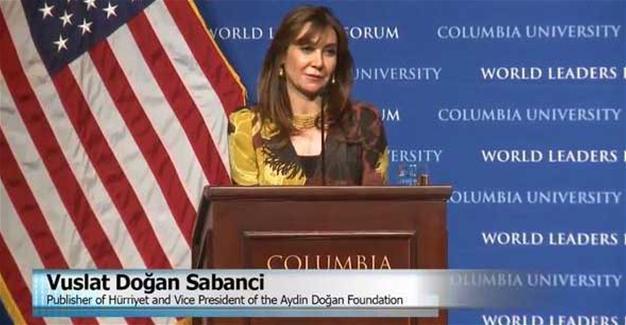Hürriyet chair Doğan Sabancı: People must learn to ‘co-exist’
Nafiz Albayrak – NEW YORK

People of the world should “acquire the ability to co-exist” as they are closely interdependent to each other in the modern day in the face of intertwined threats, daily Hürriyet Chairwoman Vuslat Doğan Sabancı has said.
“A threat in one place has an instant effect on the other side of the world. We have seen this in the field of finance, global finance, public health and climate change, and now we are seeing it in the refugee crisis and also terrorism. Anthropologists tell us that for most of human history, the vast majority of humans interacted with just 100 other humans over their whole lifetime. Today many of us interact with 100 different people a day. So we have to acquire the ability to co-exist. Otherwise the 21st century is going to be a nightmare for all of us,” said Doğan Sabancı.
Delivering a speech for the Columbia University’s World Leaders Forum panel titled “Fostering a Better Conversation and Understanding of Islam: The Vital Role of Media” on Feb. 21 at the university’s upper Manhattan campus, Doğan Sabancı began her speech by saying that she is Muslim woman who “lives my faith as I believe.”
She said in her public life she lives a “secular way of life” and is an ardent supporter of freedom of the press and human rights as businesswoman and a publisher.
Doğan Sabancı also said she sincerely appreciates secular law, which provides an unbiased approach toward everyone in society and “enables the development of science, technology, civil rights, education and economy in Turkey.”
Touching upon the privilege of being a Columbia graduate, Doğan Sabancı said when she graduated her generation believed that the world was going to be a “one big global family” and that the digital media would enable the news to be more democratic as “it was going to reach everybody instantly.”
“But we all know that it did not unfold like that. In the last 20 years, the world, instead of becoming a one happy family, became villages - unfortunately hostile villages. Globalization came with global problems. We should have gotten closer to each other but we did not know how to deal with the vast magnitude of problems and the culture clashes we had. We retrieved into our shells, into our villages. And digital media did not do much. It has indeed democratized the news but it has also accelerated the polarization,” she said.
Another effect of social media is that it has led to “rapid organizational protest rallies,” Doğan Sabancı said, adding that groups like the Islamic State of Iraq and the Levant (ISIL) “are using digital media very effectively. They are spreading their propaganda and they are recruiting. We all watched ISIL attacks in France, in Germany, in Belgium, in San Bernardino with horror.”
‘Vicious cycle’She said the Islamophobia that is becoming more widespread in the West feeds ignorance and causes hatred among people, which causes a new wave of hatred within the Muslim world in a “vicious cycle.”
The group does not only attack the Western world, but also attacks Muslims, she stressed.
“In Turkey we have had five major massacres by ISIS over the past year. On the night of New Year’s Eve, while people were celebrating in a club, they were shot a few hours into the New Year. So terror, invoked in the name of Islam, is not only a problem of the non-Muslim world. It may be an even bigger problem for the Muslim world. We can only overcome this threat by coming together as Muslims and non-Muslims,” said Doğan Sabancı, adding that the key to living together in peace is to start communicating more, however difficult this may be.
“I believe that good conversation holds more keys than the loudest slogans. I yearn for better conversations around the most difficult topics,” she said.
Click here for Vuslat Doğan Sabancı's full speech
 People of the world should “acquire the ability to co-exist” as they are closely interdependent to each other in the modern day in the face of intertwined threats, daily Hürriyet Chairwoman Vuslat Doğan Sabancı has said.
People of the world should “acquire the ability to co-exist” as they are closely interdependent to each other in the modern day in the face of intertwined threats, daily Hürriyet Chairwoman Vuslat Doğan Sabancı has said.